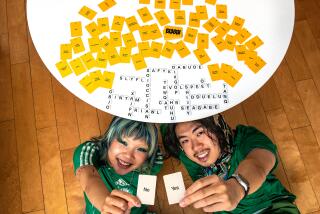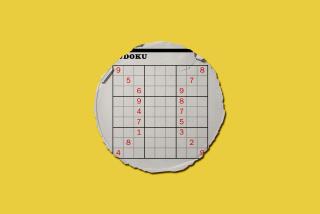Never a Cross Word for Crosswords : Expert Doug Hoylman Knows the Game Down and Across
- Share via
WASHINGTON — Doug Hoylman knows his four-letter words. He knows a four-letter word for lush (wino), a four-letter word for sign-filler (neon), a four-letter word for a male raccoon (boar).
Hoylman, of Chevy Chase, Md., is the national champion of crossword puzzles. His achievement comes at a historic time. The crossword puzzle, an enduring but ever-evolving pastime, is celebrating its 75th anniversary this year, and Hoylman, an insurance actuary with Geico, is its reigning star.
“I was the typical nerd growing up,” said Hoylman, 45, who has a master’s degree in mathematics from Massachusetts Institute of Technology. “I read a lot. I was not interested in sports. I was not interested in social activities. I guess I’m still the typical nerd. I’m a solitary kind of person, and crosswords are definitely something you do alone.”
His apartment, across the street from his Geico office, reflects his interest in the game. His seven crossword trophies cover the top of the 41-inch television set. (His favorite TV show, he said, is “Jeopardy!”) The unabridged dictionary he won after one contest lies open on a TV tray. On the table near the brown reclining chair is a stack of puzzle books, including “Fifty More Stimulating Stumpers Guaranteed to Challenge and Tantalize Any Crossword Connoisseur.”
Not a Fanatic
“The only way to practice is to do a lot of them, but I’m not a fanatic,” said Hoylman, who figures he completes 20 to 30 puzzles a week. “I’m not going to sit all evening and do them.”
Hoylman’s recent victory--over 150 other contestants at the American Crossword Puzzle Tournament in Stamford, Conn.--coincides with a period of revival for the puzzles.
Games Magazine, the largest circulation puzzle magazine in the country, touts crosswords as the most popular indoor game in America, and a recent Gallup Poll on leisure activities said 27% of the American population work the puzzles regularly.
The first crossword puzzle appeared in the old New York World on Dec. 21, 1913, according to Will Shortz, senior editor of Games Magazine.
Initially called a word-cross, it was created by Arthur Wynne, the editor of the Sunday Fun supplement who remembered seeing something similar in England as a child. The puzzle was an immediate hit as a weekly feature, but by its third appearance, the story goes, a typesetter’s mistake had changed word-cross to cross-word .
While a few newspapers picked up on the new feature, it wasn’t until 1924-25 that crossword puzzles became a fad. Suddenly, there were crossword dresses, crossword jewelry, a Broadway smash called “Puzzles of 1925,” and several hit songs, including, “Cross Word Mama, You Puzzle Me (But Papa’s Gonna Figure You Out).”
Publishing Gimmick
In that period, Shortz said, the Baltimore & Ohio Railroad went so far as to install unabridged dictionaries in its trains to assist stymied crossword players. And the Simon & Schuster publishing house was launched in 1924 with its first book, a collection of crossword puzzles. As a related publishing gimmick, the company staged the first crossword tournament in a New York hotel. By the end of 1924, six out of 10 books on the best-seller lists were crossword puzzle books.
Those early puzzles were primitive constructions with simple dictionary entries, Shortz said.
In the 1960s, crosswords started having themes and longer, clever wordplays, and by 1978, crossword tournaments were revived as annual events after a lapse of several decades. But the stage was also set for the current controversy between puzzledom’s “old school”--heavy on Latin references and obscure African rivers--and the “new wave” with its reliance on puns and contemporary language.
So heated is the dispute that the board of directors of the newly formed Crossword Hall of Fame has representatives of both camps.
The new national champion is a dedicated “new waver,” Hoylman said. His strong categories are movies and history; he is weak on popular music and sports.
The only clue he missed in the qualifying rounds for the national championship had to do with a Rolling Stones album title, “Get Your Ya-Ya’s Out,” when he incorrectly wrote yama for yaya . (“I guess I must have been thinking of that song--’The Yama Yama Man’--from one of the Fred Astaire musicals,” he said.)
At His Mother’s Knee
Growing up in Kalispell, Mont., a town of 10,000, Hoylman remembers often seeing his mother with a pencil and crossword puzzle in hand. He was perhaps 10, he said, when he worked his first crossword.
Two years ago, he began tournament competition by filling out the qualifying puzzle in a game magazine and mailing it in; at the contest, held in New York, he placed eighth. Now, with nine tournaments behind him, he is hooked on competing, he said.
In fact, he said, he combined his two hobbies--traveling and puzzles--by going on a “crossword cruise” from New York to Bermuda last summer. He easily won the tournament aboard ship.
Hoylman said he likes working crosswords for the usual reasons--the mental challenge, the fun. But he also is able to philosophize about the deeper implications of the sport.
“I like problems that have neat answers,” he said. “In our daily lives, you deal with problems that have no definite answers. You might think you have a good answer to a problem, but you’re never sure. In crosswords, there is always a right answer.”






